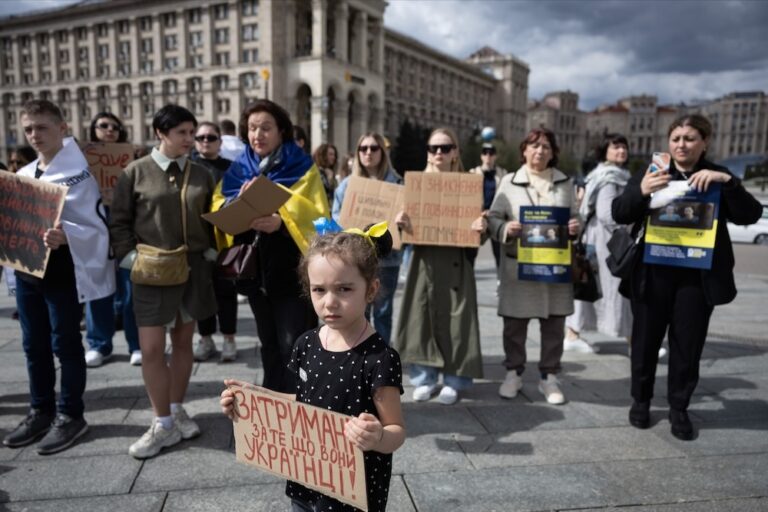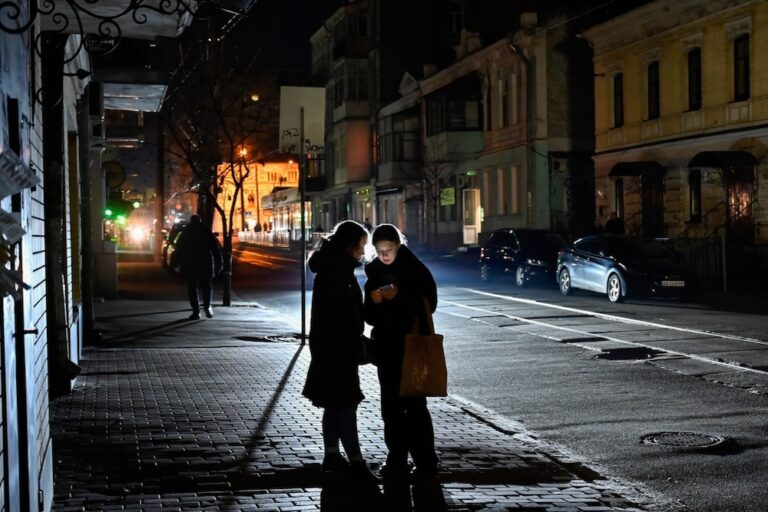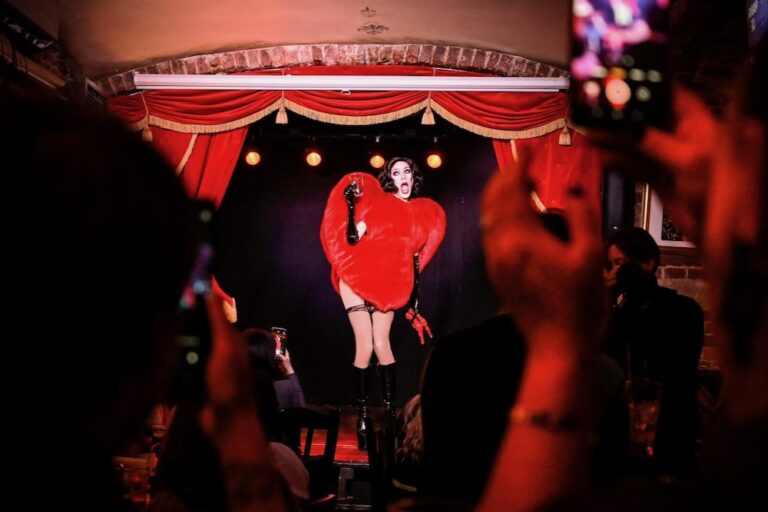For Immediate Release Russia: Reject Restrictions on Peaceful Assembly Duma to Consider Big Fines for Public Gatherings (Moscow, June 5, 2012) – Russia’s State Duma should reject the restrictive amendments to the law on public rallies and the administrative code that would severely undercut the right to peaceful assembly, Human Rights Watch said today. The […]
For Immediate Release
Russia: Reject Restrictions on Peaceful Assembly
Duma to Consider Big Fines for Public Gatherings
(Moscow, June 5, 2012) – Russia’s State Duma should reject the restrictive amendments to the law on public rallies and the administrative code that would severely undercut the right to peaceful assembly, Human Rights Watch said today. The second reading on the draft amendments will take place on June 5, 2012. The third and final reading necessary for the legislative proposal to be passed into law is therefore likely to be held before the Duma goes on summer break in July.
The proposed amendments would significantly increase the fines for violating rules for holding public events and impose various other restrictions that will make it more difficult and costly for those opposed to government policies to engage in public protests, Human Rights Watch said. The proposed amendments increase the maximum penalty for individuals from 1000 rubles (US$60) to 300,000 rubles (US$9,000). Penalties for legal entities would reach a maximum of 1 million rubles (US$30,000).
“Imposing large fines for violating rules on public events will have a chilling effect on peaceful assembly in Russia,” said Hugh Williamson, Europe and Central Asia director at Human Rights Watch. “The aim seems to be to curtail demonstrations rather than to properly regulate them.”
The right to freedom of assembly has increasingly been under attack in Russia, Human Rights Watch said. Police frequently disperse – sometimes using unnecessary or excessive force – peaceful public rallies by civil society activists and the political opposition.
The official procedure for organizing a public rally only requires notification of the local authorities, including the site and estimated number of participants. However, in practice the authorities often refuse to permit protests, using various formal pretexts and directing organizers to accept alternative locations out of the public eye. This practice pushes organizers to hold unauthorized demonstrations and to face detention and administrative punishments for violating the rules or for not complying with police orders.
The draft amendments also provide for fining those who hold gatherings without an official authorization regardless of whether they actually cause any disturbance. It provides for a fine of up to 50,000 rubles (US$1,500) if the number of participants exceeds the number indicated in the original notification and fines.
The amendments stipulate that anyone found responsible for violating the rules for public events at least twice may no longer be organizers of demonstrations and other relevant gatherings. And the rules allow local authorities to put together lists of public-event-free locations, based on considerations of public safety and public order.
“In practice, municipal authorities in large urban centers, where protest rallies are most frequent and numerous, can use this provision to ban activists from organizing rallies in desirable central locations,” Williamson said.
Finally, the draft amendments make mass movements of people or gatherings of people in one place punishable by a fine of up to 20,000 rubles (US$600), essentially considering them unsanctioned rallies even if they “bear no signs of a public event.” In theory, this measure is to be applicable only in cases when such activities interfere with traffic, cause some damage to the city infrastructure, or breach sanitation requirements.
According to numerous commentators, however, the authorities can easily find any group of protesters at fault for any of these citing, for example, alleged damage to grass in a park, alleged littering, or alleged interference with the movement of pedestrians or motor vehicles. This provision is apparently aimed at preventing civil society activists from organizing events similar to the May 13 “writers’ stroll.” The walk attracted thousands of participants, who refrained from chanting slogans or carrying posters so that the march would not be considered a rally. The new rules could also punish people for exhibiting an opposition mindset.
“If several people wearing white ribbons – the recognized symbol of the protest movement – happen to be together, walking, standing, or sitting in a public area, they could be detained by police and fined,” Williamson said.
Though the draft amendments categorize violations of the rules for holding public events as administrative offenses, the scale of the proposed fines essentially equates them with criminal offenses, Human Rights Watch said. The highest current fine for a breach of Russia’s Code of Administrative Violations is 5,000 rubles (US$160).
The right of peaceful assembly is enshrined, in addition to the Russian constitution, in the European Convention on Human Rights (ECHR) as well as the International Covenant on Civil and Political Rights (ICCPR), treaties to which Russia is a party. Article 11 of the ECHR states that, “Everyone has the right to freedom of peaceful assembly and to freedom of association with others.” Article 21 of the ICCPR states that no restrictions may be placed on the exercise of this right other than those imposed in conformity with the law and that are necessary in a democratic society in the interests of national security or public safety, public order, the protection of public health or morals, or the protection of the rights and freedoms of others.
As the European Court of Human Rights has made clear, the freedom to take part in a peaceful assembly is of such importance that a person cannot be subjected to a sanction – even one at the lower end of the scale of disciplinary penalties – for participation in a demonstration that has not been prohibited, so long as this person does not commit any reprehensible act on such an occasion.
The court has also emphasized that an unlawful situation does not justify an infringement of freedom of assembly. The court said that in instances in which demonstrators do not engage in acts of violence, it is important for the public authorities to show tolerance toward peaceful gatherings if freedom of assembly is not to be deprived of all substance.
“The proposed amendments, if adopted, provide for such broad restrictions and establish such burdensome fines that they would create insurmountable obstacles for freedom of assembly as enshrined in international law,” Human Rights Watch said.
For more Human Rights Watch reporting on Russia, please visit:
http://www.hrw.org/europecentral-asia/russia
For more information, please contact:
In Moscow, Tanya Lokshina (English, Russian): +7-916-624-1906 (mobile); or lokshina@hrw.org
In New York, Jane Buchanan (English, Russian): +1-646-644-4847 (mobile); or buchanj@hrw.org
In Berlin, Hugh Williamson (English, German): +49-172-282-0535 (mobile); or williaa@hrw.org
______________________
If you would rather not receive future communications from Human Rights Watch, please go to http://HRW.pr-optout.com/OptOut.aspx?528421x20251x80244x1x3770748x24000x6&Email=alerts%40ifex.org.
Human Rights Watch, 350 5th Ave, New York, NY 10118-0110 United States
For Immediate Release
Russia: Reject Restrictions on Peaceful Assembly
Duma to Consider Big Fines for Public Gatherings
(Moscow, June 5, 2012) – Russia’s State Duma should reject the restrictive amendments to the law on public rallies and the administrative code that would severely undercut the right to peaceful assembly, Human Rights Watch said today. The second reading on the draft amendments will take place on June 5, 2012. The third and final reading necessary for the legislative proposal to be passed into law is therefore likely to be held before the Duma goes on summer break in July.
The proposed amendments would significantly increase the fines for violating rules for holding public events and impose various other restrictions that will make it more difficult and costly for those opposed to government policies to engage in public protests, Human Rights Watch said. The proposed amendments increase the maximum penalty for individuals from 1000 rubles (US$60) to 300,000 rubles (US$9,000). Penalties for legal entities would reach a maximum of 1 million rubles (US$30,000).
“Imposing large fines for violating rules on public events will have a chilling effect on peaceful assembly in Russia ,” said Hugh Williamson , Europe and Central Asia director at Human Rights Watch. “The aim seems to be to curtail demonstrations rather than to properly regulate them.”
The right to freedom of assembly has increasingly been under attack in Russia, Human Rights Watch said. Police frequently disperse – sometimes using unnecessary or excessive force – peaceful public rallies by civil society activists and the political opposition.
The official procedure for organizing a public rally only requires notification of the local authorities, including the site and estimated number of participants. However, in practice the authorities often refuse to permit protests, using various formal pretexts and directing organizers to accept alternative locations out of the public eye. This practice pushes organizers to hold unauthorized demonstrations and to face detention and administrative punishments for violating the rules or for not complying with police orders.
The draft amendments also provide for fining those who hold gatherings without an official authorization regardless of whether they actually cause any disturbance. It provides for a fine of up to 50,000 rubles (US$1,500) if the number of participants exceeds the number indicated in the original notification and fines.
The amendments stipulate that anyone found responsible for violating the rules for public events at least twice may no longer be organizers of demonstrations and other relevant gatherings. And the rules allow local authorities to put together lists of public-event-free locations, based on considerations of public safety and public order.
“In practice, municipal authorities in large urban centers, where protest rallies are most frequent and numerous, can use this provision to ban activists from organizing rallies in desirable central locations,” Williamson said.
Finally, the draft amendments make mass movements of people or gatherings of people in one place punishable by a fine of up to 20,000 rubles (US$600), essentially considering them unsanctioned rallies even if they “bear no signs of a public event.” In theory, this measure is to be applicable only in cases when such activities interfere with traffic, cause some damage to the city infrastructure, or breach sanitation requirements.
According to numerous commentators, however, the authorities can easily find any group of protesters at fault for any of these citing, for example, alleged damage to grass in a park, alleged littering, or alleged interference with the movement of pedestrians or motor vehicles. This provision is apparently aimed at preventing civil society activists from organizing events similar to the May 13 “ writers’ stroll .” The walk attracted thousands of participants, who refrained from chanting slogans or carrying posters so that the march would not be considered a rally. The new rules could also punish people for exhibiting an opposition mindset.
“If several people wearing white ribbons – the recognized symbol of the protest movement – happen to be together, walking, standing, or sitting in a public area, they could be detained by police and fined,” Williamson said.
Though the draft amendments categorize violations of the rules for holding public events as administrative offenses, the scale of the proposed fines essentially equates them with criminal offenses, Human Rights Watch said. The highest current fine for a breach of Russia’s Code of Administrative Violations is 5,000 rubles (US$160).
The right of peaceful assembly is enshrined, in addition to the Russian constitution, in the European Convention on Human Rights (ECHR) as well as the International Covenant on Civil and Political Rights (ICCPR), treaties to which Russia is a party. Article 11 of the ECHR states that, “Everyone has the right to freedom of peaceful assembly and to freedom of association with others.” Article 21 of the ICCPR states that no restrictions may be placed on the exercise of this right other than those imposed in conformity with the law and that are necessary in a democratic society in the interests of national security or public safety, public order, the protection of public health or morals, or the protection of the rights and freedoms of others.
As the European Court of Human Rights has made clear, the freedom to take part in a peaceful assembly is of such importance that a person cannot be subjected to a sanction – even one at the lower end of the scale of disciplinary penalties – for participation in a demonstration that has not been prohibited, so long as this person does not commit any reprehensible act on such an occasion.
The court has also emphasized that an unlawful situation does not justify an infringement of freedom of assembly. The court said that in instances in which demonstrators do not engage in acts of violence, it is important for the public authorities to show tolerance toward peaceful gatherings if freedom of assembly is not to be deprived of all substance.
“The proposed amendments, if adopted, provide for such broad restrictions and establish such burdensome fines that they would create insurmountable obstacles for freedom of assembly as enshrined in international law,” Human Rights Watch said.
For more Human Rights Watch reporting on Russia, please visit:
http://www.hrw.org/europecentral-asia/russia
For more information, please contact:
In Moscow, Tanya Lokshina (English, Russian): +7-916-624-1906 (mobile); or lokshina@hrw.org
In New York, Jane Buchanan (English, Russian): +1-646-644-4847 (mobile); or buchanj@hrw.org
In Berlin, Hugh Williamson (English, German): +49-172-282-0535 (mobile); or williaa@hrw.org
If you would rather not receive future communications from Human Rights Watch, let us know by clicking here. Human Rights Watch, 350 5th Ave, New York, NY 10118-0110 United States


